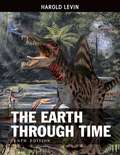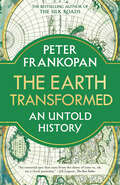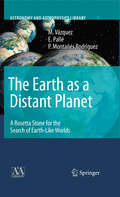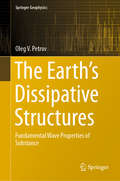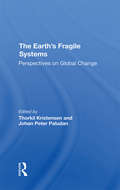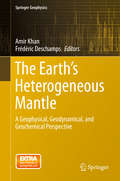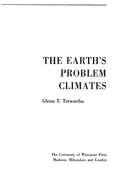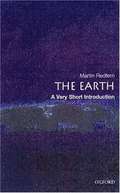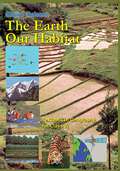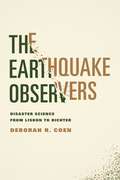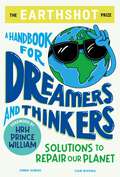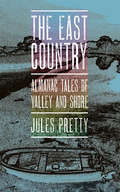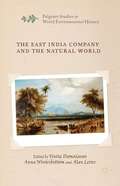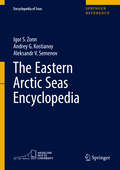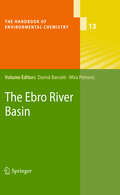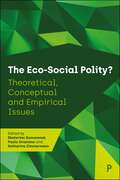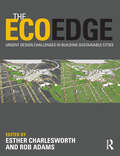- Table View
- List View
The Earth Through Time, Tenth Edition
by Harold L. LevinThis new edition offers many new and enhanced features, including more than a hundred new figures, 75 new questions at end of chapter "Questions for Review and Discussion", and additional "Enrichment Boxes." Furthermore, new sections have been added, including: A Variety of Paleozoic Living Strategies and What Lies Ahead for Humanity. The revised Geological Time Scale is also included to conform to the most recent recommendation of the International Congress on Stratigraphic Nomenclature.
The Earth Transformed: An Introduction to Human Impacts on the Environment
by Andrew S. Goudie Heather A. VilesThe Earth Transformed answers the need for a concise, non-technical introduction to the ways in which the natural environment has been and is being affected by human activities. It is simply and engagingly written, and illustrated with maps, diagrams, figures and photographs. Among the subjects described and considered by the authors are desertification, deforestation, wetland management, biodiversity, climatic change, air pollution, the impact of cities on climate and hydrology, erosion, salinization, waste disposal, sea level rise, marine pollution, coral reef degradation and aquaculture. The book is organized around 45 case studies taken from all parts of the globe and chosen for their intrinsic interest and representative nature. Further features of the book include guides to further reading, suggestions for debate and study, and a glossary of terms. The book is aimed to meet the needs of students beginning courses on environmental science and geography.
The Earth Transformed: An Untold History
by Peter FrankopanA NEW YORKER BEST BOOK OF THE YEAR • A revolutionary new history that reveals how climate change has dramatically shaped the development—and demise—of civilizations across time*The ebook edition now includes endnotes. Anyone who purchased the book previously can re-download this updated edition and access the notes.* Global warming is one of the greatest dangers mankind faces today. Even as temperatures increase, sea levels rise, and natural disasters escalate, our current environmental crisis feels difficult to predict and understand. But climate change and its effects on us are not new. In a bold narrative that spans centuries and continents, Peter Frankopan argues that nature has always played a fundamental role in the writing of history. From the fall of the Moche civilization in South America that came about because of the cyclical pressures of El Niño to volcanic eruptions in Iceland that affected Egypt and helped bring the Ottoman empire to its knees, climate change and its influences have always been with us. Frankopan explains how the Vikings emerged thanks to catastrophic crop failure, why the roots of regime change in eleventh-century Baghdad lay in the collapse of cotton prices resulting from unusual climate patterns, and why the western expansion of the frontiers in North America was directly affected by solar flare activity in the eighteenth century. Again and again, Frankopan shows that when past empires have failed to act sustainably, they have been met with catastrophe. Blending brilliant historical writing and cutting-edge scientific research, The Earth Transformed will radically reframe the way we look at the world and our future.
The Earth Wants YOU
by Reverend Billy Talen"You must check out the newest from my favorite transcendent and down to earth preacher."--Laurie Anderson, artist, musicianThe Earth Wants YOU is a motivational handbook, filled with inspired visions of a wild, creative, Earth-led cultural revolution. Reverend Billy and the Church of Stop Shopping offer up a heady mix of humor, insightful critique, passionate commitment, emotional catharsis, and example after example of vibrant direct action. Stop shopping and feel the love as you sign up for the struggle of our lives! Earthalujah!Praise for The Earth Wants YOU:"Singing instructions for joining the Earthalujah choir!"--Jodie Evans, CODEPINK"My Earthmojis are smiling for Reverend Billy! And that's all the dirt you're gonna get from me. O;"--Justin Vivian Bond, trans-genre artist, Radical Faerie"Mama Earth will shake us ALL off unless we shake shit UP and shut it DOWN!"--Bertha Lewis, The Black Institute"This is what makes social movements succeed--it's the big love-slog we have to go through to achieve change."--Andy Bichlbaum, The Yes Men"Join Rev and his merry band of activists as they imagine ways of arousing concern for the environment and racial justice."--Coco Fusco, creator of Eu Sou Um Consumidor"When the singing activists hit the high notes in a bank lobby or a DARPA lab or the back aisle of a Walmart, they wipe away the veils hiding the madness of our corporate-controlled, consumer-crazed society."--Annie Leonard, director of Greenpeace USA"Ssssh, listen . . . let the Church of Stop Shopping exorcise your fear, doubt and burnout, and join the Earthalujah Revolution!"-Jess Worth, BP or not BP?"This call to action is at once sobering and encouraging. We have fucked up really badly, but the ability to see it-is the first and hardest step toward fixing it."--Douglas Rushkoff, author of Throwing Rocks at the Google Bus"Reverend Billy's ALL IN! bodies and voices . . . not just clicks and posts, for this small village we call Earth. Preach On!"--Obang Metho, Solidarity Movement for a New Ethiopia"The Stop Shoppers packs a whoop."--Roberto Sifuentes, La Pocha Nostra"In between satire and silence, there is a space of penetrating reckoning for all vibrations that flow counter to the balance of Nature. And from this dynamic and tricky space, the Honorable Reverend and his Holified Choir will shout, sing and sermonize a soul-bound love message of Truthalujah!"--John Sims, The AfroDixie Remixes"The Church of Stop Shopping is in the vanguard of a new movement that challenges this consumer society that is killing our planet."--Mike Roselle, Climate Ground Zero and Coal River Mountain Watch"Billy, Savi and the choir have love and optimistic humor, and they don't give up on people."--David LaChapelle, comedian"He seems to be writing while his actions are going on, like he can write while he's hand-cuffed."--Benny Zable, The Nimbin Environment Centre, NSW Australia"The Earth Wants You takes readers deep inside the heart, mind and balls of the activist-artist. Reverend Billy rocks hard!"--Annie Sprinkle, artist, ecosexual sexecologist"He was a comic act. Now he's evolved into a man compulsively challenging the true extent of the right to protest."--Anohni, creator of the song "4 Degrees"Reverend Billy and his choir of singing-activists are on the front lines of creative direct action, and here they offer up a distillation of the passion, the inspiration, and the hopes for love and survival that fuel their work. In a mix of essays, polemics, surrealist scenarios and news flashes from the frontlines, Reverend Billy answers the question, "What are we to do?" with a resounding chorus of "Take Action NOW!"
The Earth and Beyond (Wonders of Science)
by Joan S. GottliebScience textbook for children, about the planets in the solar system.
The Earth and I
by Arthur FirstenbergAlmost all environmental books treat the environmental crisis as though humans are in charge of nature, rather than part of it. The Earth and I is the first book to put all preconceived notions aside and to ask, naïvely: Who are we really? What is our relationship to the earth? How is it possible that we, out of all the millions of species, have come to destroy our common home? The answers are surprising and have far-reaching implications for those searching for solutions. Part One tells what is happening to the earth&’s systems and how they are being destroyed. It rewrites the two-million-year history of humanity&’s tenure on the earth as if we are part of nature and not separate from it, and describes both the earth and the universe as living systems. It paints a global, coherent picture of the devastation to Earth&’s air, water, forests, and creatures that is not found elsewhere. It reviews assaults on these systems that are not treated adequately, if at all, elsewhere: chemicals; radiation; plastics; detergents; biocides; noise; cars; and guns. Part Two, &“Digging below the Surface,&” asks why, and enters territory not previously explored by environmentalists. It describes the various ways to make a living on the earth—hunting and gathering, shifting agriculture, nomadic herding, settled agriculture, and industrial technology—as choices, not eras—choices coexisting with one another until today. It rewrites economics. It explores the relationship of warfare, slavery, religion, and human sexuality to the environmental crisis. And it is forced to conclude that these aspects of human culture are not only shaped, but created by the technologies we use; that the use of non-human sources of energy interferes with human psychological development; and that the unfulfilled urges within us explode in the violent technologies that are destroying our planet. The solutions, if it is not too late, therefore lie in wise choice, rather than wise use, of our technologies.
The Earth as a Distant Planet
by E. Pallé P. Montañés Rodríguez M. VázquezIn The Earth as a Distant Planet, the authors become external observers of our solar system from a distance and try to determine how one can understand how Earth, the third in distance to the central star, is essentially unique and capable of sustaining life. The knowledge gained from this original perspective is then applied to the search for other planets outside the solar system, or exoplanets. Since the discovery in 1992 of the first exoplanet, the number of planet detections has increased exponentially and ambitious missions are already being planned for the future. The exploration of Earth and the rest of the rocky planets are Rosetta stones in classifying and understanding the multiplicity of planetary systems that exist in our galaxy. In time, statistics on the formation and evolution of exoplanets will be available and will provide vital information for solving some of the unanswered questions about the formation, as well as evolution of our own world and solar system. Special attention is paid to the biosignatures (signs of life) detectable in the Earth's reflected spectra and the search for life in the universe. The authors are experts on the subject of extrasolar planets. They provide an introductory but also very much up-to-date text, making this book suitable for researchers and for advanced students in astronomy and astrophysics.
The Earth's Dissipative Structures: Fundamental Wave Properties of Substance (Springer Geophysics)
by Oleg V. PetrovThis volume describes physical, formal mathematical and exterior (morpho-structural) manifestations of wave dynamics of the Earth, defining both its deep structural image, and the external shape of planet. In addition to the standard imagination about waves in the geological environment as short-term seismological and seismic effects, wave dynamics of the Earth are considered as long-time process, comparable to the geochronological scale. The book consists of a systematic description of the conformities discovered in the set of heterogeneous and different-order objects, which have space-related regularity and recurrence at the different levels of resolution of analysis of natural systems. For expert-geologist it includes the basis of the geodynamic wave-related concept which enables to add to the traditional concept of plate tectonics, as well as the methods of quantitative interpretation of measured geo-fields.
The Earth's Fragile Systems: Perspectives On Global Change
by Thorkil Kristensen Johan Peter PaludanThe Earth's Fragile Systems is concerned with some of the most pressing and worrying of the problems afflicting our globe, problems that have been discussed in various forums and are well known not to be simple intellectually, practically or politically.
The Earth's Heterogeneous Mantle
by Amir Khan Frédéric DeschampsThis book highlights and discusses recent developments that have contributed to an improved understanding of observed mantle heterogeneities and their relation to the thermo-chemical state of Earth's mantle, which ultimately holds the key to unlocking the secrets of the evolution of our planet. This series of topical reviews and original contributions address 4 themes. Theme 1 covers topics in geophysics, including global and regional seismic tomography, electrical conductivity and seismic imaging of mantle discontinuities and heterogeneities in the upper mantle, transition zone and lower mantle. Theme 2 addresses geochemical views of the mantle including lithospheric evolution from analysis of mantle xenoliths, composition of the deep Earth and the effect of water on subduction-zone processes. Theme 3 discusses geodynamical perspectives on the global thermo-chemical structure of the deep mantle. Theme 4 covers application of mineral physics data and phase equilibrium computations to infer the regional-scale thermo-chemical structure of the mantle.
The Earth's Magnetic Interior
by David Ivers Eduard Petrovský Emilio Herrero-Bervera T HarinarayanaThis volume combines review and solicited contributions, related to scientific studies of Division I of IAGA presented at its Scientific Assembly in Sopron in 2009. The book is aimed at intermediate to advanced readers dealing with the Earth's magnetic field generation, its historical records in rocks and geological formations - including links to geodynamics and magnetic dating, with magnetic carriers in earth materials, electromagnetic induction and conductivity studies of the Earth interior with environmental applications of rock magnetism and electromagnetism. The aim of the book is to provide an overview of recent advances and future challenges in these particular fields of research.
The Earth's Problem Climates
by Glenn T. TrewarthaLatin America; Australia-New Zealand-Equatorial Pacific; Africa-Southern and Eastern Asia; Europe and the mediterranean Borderlands; Anglo-America.
The Earth: A Very Short Introduction
by Martin RedfernAround 30 years ago, two things happened that were to revolutionize the understanding of our home planet. First, geologists realized that the continents themselves were drifting across the surface of the globe and that oceans were being created and destroyed. Secondly, pictures of the entire planet were returned from space. Suddenly, the Earth began to be viewed as a single entity; a dynamic, interacting whole, controlled by complex processes we scarcely understood. This Introduction explores emerging geological research and explains how new advances in the understanding of plate tectonics, seismology, and satellite imagery have enabled us to begin to see the Earth as it actually is: dynamic and ever changing.
The Earth: Our Habitat class 6 - NCERT - 23
by National Council of Educational Research and Training"The Earth: Our Habitat" is a comprehensive textbook designed for sixth-grade students studying geography. This book delves into the intricate details of our planet, exploring various geographical aspects crucial to understanding Earth as our habitat. It covers diverse topics, such as the structure of the Earth, its landforms, climate patterns, natural resources, and the significance of environment conservation. The content is presented in a student-friendly manner, incorporating vivid illustrations, maps, and engaging exercises to facilitate better comprehension. The book aims to foster a deep appreciation for the Earth's complexity and its role as the ultimate home for all living beings. Through its detailed exploration of geography, "The Earth: Our Habitat" intends to instill a sense of responsibility among young learners towards preserving and nurturing the environment. Overall, it serves as a foundational guide, encouraging students to grasp the fundamental concepts of geography while emphasizing the importance of caring for our planet, ensuring a sustainable future for generations to come.
The Earthquake Observers: Disaster Science from Lisbon to Richter
by Deborah R. CoenEarthquakes have taught us much about our planet's hidden structure and the forces that have shaped it. This knowledge rests not only on the recordings of seismographs but also on the observations of eyewitnesses to destruction. During the nineteenth century, a scientific description of an earthquake was built of stories--stories from as many people in as many situations as possible. Sometimes their stories told of fear and devastation, sometimes of wonder and excitement. In The Earthquake Observers, Deborah R. Coen acquaints readers not only with the century's most eloquent seismic commentators, including Alexander von Humboldt, Charles Darwin, Mark Twain, Charles Dickens, Karl Kraus, Ernst Mach, John Muir, and William James, but also with countless other citizen-observers, many of whom were women. Coen explains how observing networks transformed an instant of panic and confusion into a field for scientific research, turning earthquakes into natural experiments at the nexus of the physical and human sciences. Seismology abandoned this project of citizen science with the introduction of the Richter Scale in the 1930s, only to revive it in the twenty-first century in the face of new hazards and uncertainties. The Earthquake Observers tells the history of this interrupted dialogue between scientists and citizens about living with environmental risk.
The Earthshot Prize: Solutions to Repair our Planet
by Jonnie Hughes Colin ButfieldAn empowering and practical handbook for young changemakers who want to save the planet! Published in collaboration with the prestigious Earthshot Prize, featuring an introduction from HRH Prince William and contributions from environmental activists including Sir David Attenborough, Christiana Figueres and Shailene Woodley.'Our planet is the only home we have, and we must think big and dream bigger if we are to protect it.'- HRH Prince WilliamThe mission is simple: to repair our planet.Our home is in trouble. The good news is we can fix it - but we need YOUR help. So let's put our heads together and dream up ways to BUILD, CREATE and SHOUT about solutions to repair our planet. In the Earthshot Handbook for Future Dreamers and Thinkers, young readers will travel round the world, celebrating the diverse and rich habitats, amazing animals and wonderful landscapes that make up our planet. They'll learn about the problems and challenges facing those habitats. They will meet Earthshot innovators, entrepreneurs and game changers from the past and present from Wangari Maathai to David Attenborough. And importantly, they'll discover how they can become the changemakers of the future, helping to develop solutions to the world's biggest problems. Because even the smallest idea or Earthshot, has the power to change everything. Full of simple practical things young people can do or make to help save the planet, even from home, as well as big ideas and contributions from people around the globe, this is the ultimate handbook for future innovators and activists who want to make a difference.Contributors to this book:HRH Prince William Naturalist Sir David Attenborough Former UN Climate Chief Christiana FigueresActor Shailene WoodleyAstronaut Naoko YamazkiEnvironmental Activist Hindou Oumarou Ibrahim
The Earth’s Free Oscillations: Formulation and Solution of the Fundamental Wave Equation of Nature
by Oleg V. PetrovThis book presents the formulations and solutions of the wave equation for the Earth’s free oscillations concerning the particular nodal, bifurcation, perspectival, and projective reference points within the framework of the three “great geometries” of Euclid, Lobachevsky, and Riemann. When studying the relationship between the propagation velocity of various types of bulk and surface seismic waves with radial, spheroidal, and torsional eigen oscillations of the Earth having corresponding periods, we are struck by the fundamental problem of obtaining reference points that allow physical meaning to be attributed to all these discrete oscillatory and continuous wave phenomena that occur in nature. Several unsuccessful attempts tried to unify the relationship of discrete oscillations and the velocity of waves and light occurring in seismology and other phenomena associated with gravity and matter, using a three-dimensional visual space-time model continuous Euclidean space. Using simple and illustrative examples for describing the free oscillations of the Earth and taking into account new visible event horizons related to the velocity of waves and light propagation, the author formulated and solved the fundamental wave equation of nature in the form of the three “great theorems”: Galilean, Lorentz, and Poincaré spatiotemporal transformations.
The Earth’s Inner Core: Revealed by Observational Seismology
by Hrvoje TkalčićThe inner core is a planet within a planet: a hot sphere with a mass of one hundred quintillion tons of iron and nickel that lies more than 5000 kilometres beneath our feet. It plays a crucial role in driving outer core fluid motion and the geodynamo, which generates the Earth's magnetic field. This book is the first to provide a comprehensive review of past and contemporary research on the Earth's inner core from a seismological perspective. Chapters cover the collection, processing and interpretation of seismological data, as well as our current knowledge of the structure, anisotropy, attenuation, rotational dynamics, and boundary of the inner core. Reviewing the latest research and suggesting new seismological techniques and future avenues, it is an essential resource for both seismologists and non-seismologists interested in this fascinating field of research. It will also form a useful resource for courses in seismology and deep Earth processes.
The East Country: Almanac Tales of Valley and Shore
by Jules PrettyThe East Country is a work of creative nonfiction in which the acclaimed nature writer Jules Pretty integrates memoir, natural history, cultural critique, and spiritual reflection into a single compelling narrative. Pretty frames his book around Aldo Leopold and his classic A Sand County Almanac, bringing Leopold’s ethic—that some could live without nature but most should not—into the twenty-first century. In The East Country, Pretty follows the seasons through seventy-four tales set in a variety of landscapes from valley to salty shore. Pretty convinces us that we should all develop long attachments to the local, observing that the land can change us for the better.
The East India Company and the Natural World
by Vinita DamodaranThis book is the first to explore the deep and lasting impacts of the largest colonial trading company, the British East India Company on the natural environment. The contributors - drawn from a wide range of academic disciplines - illuminate the relationship between colonial capital and the changing environment between 1600 and 1857.
The Eastern Arctic Seas Encyclopedia
by Andrey G. Kostianoy Igor S. Zonn Aleksandr V. SemenovThis Encyclopedia is designed to accumulate and systematize our knowledge about the unique natural water areas - the Laptev, East Siberian and Chukchi seas, their wealth, the events that took place on its waters and shores, and the remarkable people whose lives were and are closely intertwined with the seas. The Encyclopedia contains about 1,500 terms and concepts related to the seas in alphabetical order. It describes geographical features: rivers, lakes, straits, bays; provides information about towns, seaports, transport communications, basic aquatic biological species, nature reserves, national and international programs for the study of the sea, research institutes, historical monuments, activities of prominent explorers and travelers, researchers and scientists. The Encyclopedia also includes a chronology of major historical events connected with the Eastern Arctic seas for more than 400 years.
The Ebro River Basin
by Damià Barceló Mira PetrovicThe Ebro is a typical Mediterranean river characterized by seasonal low flows and extreme flush effects, with important agricultural and industrial activity that has caused heavy contamination problems. This volume deals with soil-sediment-groundwater related issues in the Ebro river basin and summarizes the results generated within the European Union-funded project AquaTerra. The following topics are highlighted: Hydrology and sediment transport and their alterations due to climate change, aquatic and riparian biodiversity in the Ebro watershed, occurrence and distribution of a wide range of priority and emerging contaminants, effects of chemical pollution on biota and integration of climate change scenarios with several aspects of the Ebro's hydrology and potential impacts of climate change on pollution. The primary objective of the book is to lay the foundation for a better understanding of the behavior of environmental pollutants and their fluxes with respect to climate and land use changes.
The Eco Chick Guide to Life: How to Be Fabulously Green
by Starre VartanSAVE THE WORLD IN STYLE!Lower your carbon footprint—in your favorite pair of stilettos—with THE ECO CHICK GUIDE TO LIFE. Here you'll find hundreds of ideas on how to be ecologically smart and still be stylish and trend-setting. You don't have to sacrifice to go green—you can eat well, dress well, and live well once you learn how to:Learn where to shop for vintage and recycled jewelry (mining practices for gold and silver are notoriously polluting).Wear sustainable threads—organic cotton, peace silk, bamboo—or look for funky reconstructed designs made from vintage fabrics.Find shoes made from naturally tanned and dyed leather, hemp, or made from recycled materials...that still look incredibly chic.Party it up- with the planet in mind! Make your next fiesta fabulous with organic beverages, seasonal food from the farmer's market, and more. Pretty-up with organic, biodegradable hair products, body washes, moisturizers, and make-up—better for you and the planet's water supplies! We'll explain why and what to look for.How to earn points while convincing your boss to go green in your office.Travel green and still see the world in style!Save cash with some Earth-loving swaps around your apartment, dorm or house.…and more. Let these and other easy-to-follow, fun and fashionable tips help you to feel great while doing good. You and Mother Nature will look fabulous!This book is printed on recycled paper.
The Eco-Social Polity?: Theoretical, Conceptual and Empirical Issues
by Ekaterina Domorenok, Paolo Graziano and Katharina ZimmermannThe devastating effects of climate change are undeniable. Fires rage and waters rise in every corner of the globe. In light of these changes to our planet, the issue of social and environmental wellbeing has gained prominent attention from both academia and policy makers. Scholarly research on the interaction between social and employment policy domains has flourished. Academics now reflect on the different aspects of environmental and social protection, ecological and social risks, and the costs of climate change, sustainable welfare and new social movements prompted by green transitions. This book provides a vital contribution to the emerging research agenda. It brings together scholars from interconnected disciplines to discuss the eco-social debate, providing a critical overview on extant scholarship and reflecting on future research pathways on the eco-social nexus from a variety of analytical perspectives.
The EcoEdge: Urgent Design Challenges in Building Sustainable Cities
by Esther Charlesworth Rob AdamsPresenting diverse case studies of contemporary sustainable urban practice from Europe, Africa, India, South America, the USA and Australia, this book offers the reader a fantastic wealth of practical material from a range of internationally renowned authors. Each practical case study has addressed issues and then offered solutions to implement sustainable cities across a range of urban scales and cultures. Urgent design challenges explored include population density, recreating infrastructure that supports carbon neutral or low carbon (emission) intensive urban activities, and retrofitting for sustainability. Highly illustrated, thematically focused and with superb global coverage, this book presents a multi-voiced and yet highly cohesive reference for anyone interested in green issues in urban design and architecture.
